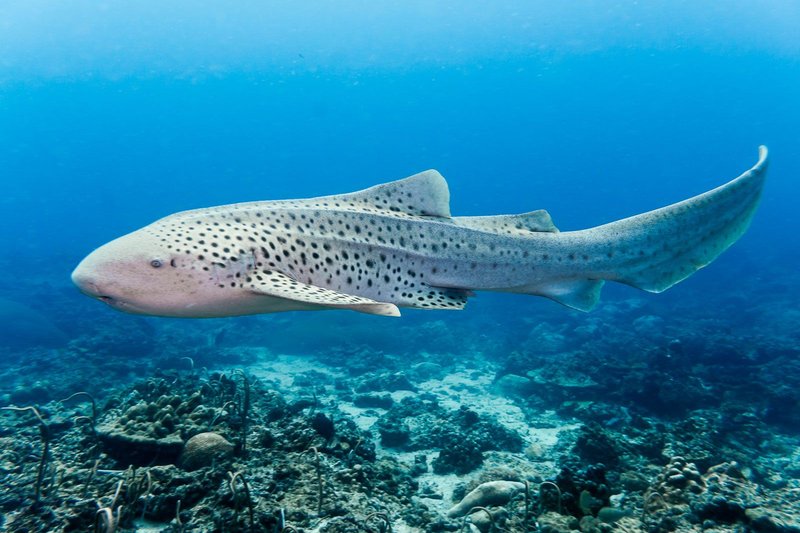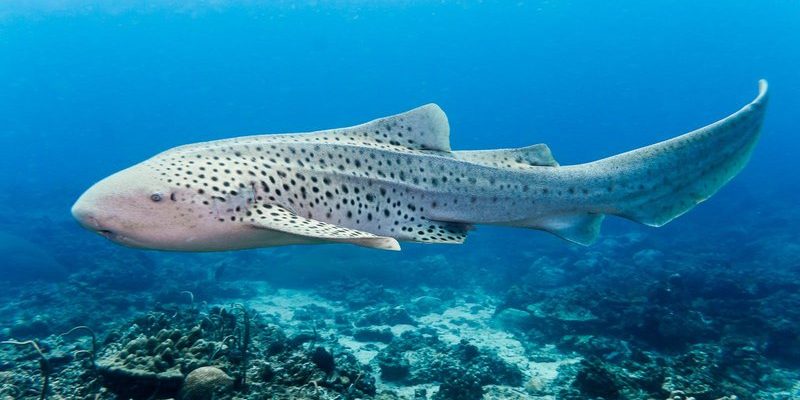
Zebra sharks, also known as *Stegostoma fasciatum*, are typically found in the warm waters of tropical and subtropical reefs. They mainly inhabit the shallow waters of the Indian and Pacific Oceans. Despite their calm demeanor and distinct appearance, zebra sharks have come under pressure from various environmental factors. Let’s break down what’s happening with their conservation status and what we can do to help.
What Are Zebra Sharks?
Zebra sharks are unique members of the shark family, and they’re often mistaken for a different species due to their appearance. They sport a beautiful pattern of stripes and spots, which is particularly pronounced in young sharks. As they mature, they gain a more spotted look. You might think of them as the “gentle giants” of the shark world.
These sharks are primarily nocturnal hunters, preferring to spend their days resting on the ocean floor. You could say they’re like the couch potatoes of the sea! They feed mainly on mollusks, crustaceans, and small fish. Their elongated bodies, which can stretch up to 10 feet, allow them to glide gracefully through the water.
Are Zebra Sharks Endangered?
The short answer is yes; zebra sharks are currently listed as **vulnerable** by the International Union for Conservation of Nature (IUCN). This means they face a high risk of endangerment in the wild. Several factors contribute to their vulnerable status, including habitat destruction, overfishing, and inadequate protections in some areas.
You might wonder what habitat destruction looks like. In many cases, coastal development and pollution lead to the degradation of coral reefs, which are essential for zebra sharks’ survival. The loss of these ecosystems has a direct impact on their ability to find food and shelter.
Threats to Zebra Sharks
Understanding the threats zebra sharks face is vital for their conservation. Here are some of the key factors:
- Overfishing: Zebra sharks are often caught unintentionally through bycatch in commercial fishing operations. They can also be targeted for their unique meat and fins, which are considered delicacies in some cultures.
- Habitat Loss: As mentioned earlier, coastal development and pollution are harmful to their habitats. Coral reefs, where they thrive, are under immense pressure from tourism, construction, and climate change.
- Climate Change: Rising ocean temperatures and acidification affect the marine environment. This can lead to coral bleaching, which directly impacts the zebra shark’s habitat.
It’s crucial to keep these threats in mind. Each of them plays a role in the overall decline of zebra shark populations, and addressing them is key to ensuring their survival.
Conservation Efforts
The good news is that many organizations are actively working to protect zebra sharks. Here are a few conservation efforts making an impact:
- Marine Protected Areas (MPAs): Establishing MPAs helps safeguard vital habitats from destructive fishing practices and pollution. These areas allow zebra sharks to thrive without human interference.
- Education and Awareness: Spreading the word about zebra sharks helps raise awareness about their plight. Many organizations hold workshops and campaigns to educate people on the importance of conserving these creatures.
- Research Initiatives: Scientists are studying zebra sharks to better understand their behavior, breeding habits, and habitats. This information is crucial for developing effective conservation strategies.
You might be surprised at how impactful even small efforts can be. Each step taken toward conservation helps illuminate the path to a more secure future for these sharks.
What You Can Do to Help
So, what can you do to help zebra sharks? Here are some simple actions you can take:
- Support Sustainable Seafood: Choose seafood that is caught or farmed sustainably. This helps reduce overfishing and protects marine ecosystems.
- Participate in Clean-Up Events: Join or organize beach clean-ups in your community. Reducing ocean pollution is vital for all marine life.
- Advocate for Protection: Support policies and initiatives that aim to protect marine habitats and promote conservation efforts.
Taking action, no matter how small, contributes to the bigger picture of saving zebra sharks and other marine life.
The Future of Zebra Sharks
Looking ahead, the future of zebra sharks depends on our collective efforts to address the challenges they face. While their status as vulnerable is concerning, increased awareness and action can lead to a more optimistic outlook. Many conservationists believe that with the right measures in place, zebra shark populations can recover.
Imagine a world where these remarkable creatures roam freely in thriving coral reefs, contributing to the underwater ecosystem. It’s a vision worth striving for, and every effort counts.
In summary, zebra sharks are indeed endangered, but the journey to recovery is possible with combined efforts at the individual and organizational levels. By understanding their unique needs and the threats they face, we can take steps to help ensure these gentle sharks continue to grace our oceans.
So, whether it’s choosing sustainable seafood, volunteering for clean-ups, or simply raising awareness, remember that every little action can make a significant difference. Together, we can create a brighter future for zebra sharks and the countless other species that share our oceans. Every effort counts, and we can be part of the solution.

